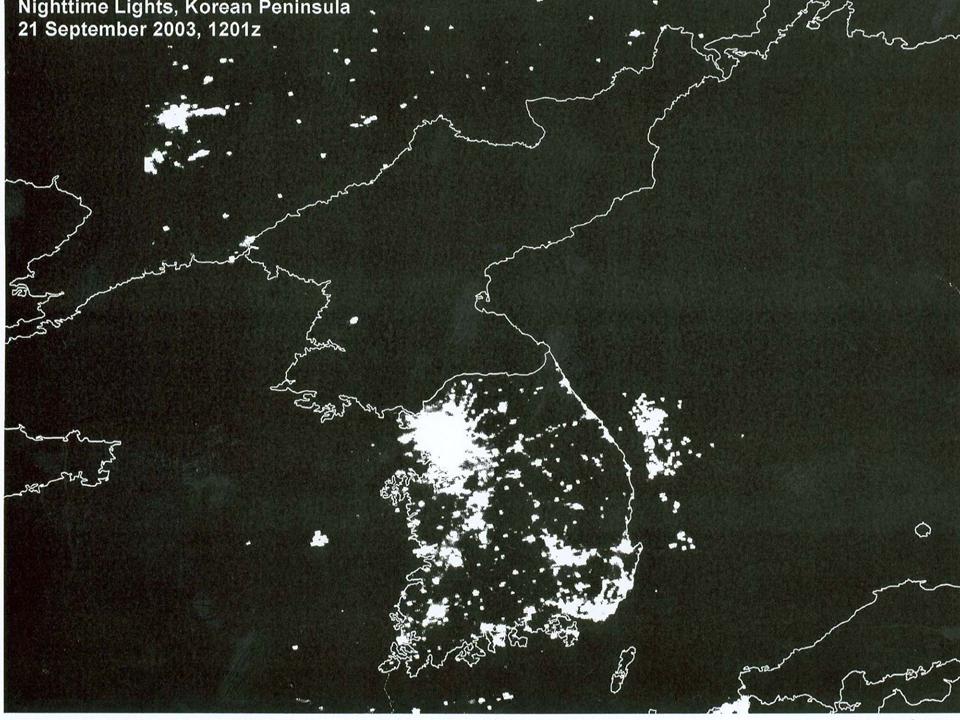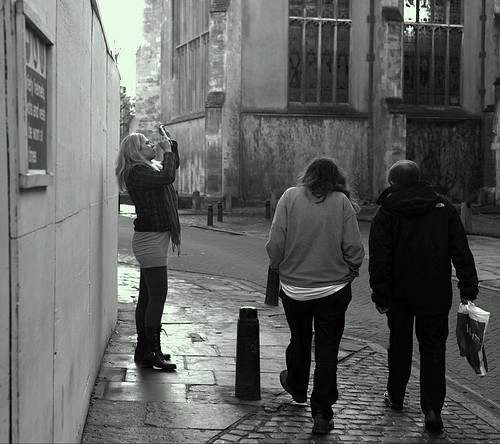George Orwell likened advertising to “the rattling of a stick in a swill bucket”. Perhaps that was because the advertising is his day was so crass — like this ad which probably dates from late Victorian times. But here’s a terrible thought: maybe this looked cool and clever to those at whom it was aimed. And maybe our own oh-so-cool-and-clever advertising will look just as pathetic and dated to our great grandchildren.
Shopaholicism
I hate shopping (one reason why I am ambivalent about Christmas), and am constantly amazed by people who apparently love doing it. Here are some examples: the people queueing for our local park-and-ride bus heading into the post-Xmas ‘sales’. Weird.
Rationality’s feeble grip
This is the scariest thing I’ve seen all year: the mass hysteria in North Korea following on the death of yer man (whose name I can never remember). The big question is: is it really possible to induce this kind of mass hypnosis in millions of people? The answer: apparently, yes.
As Andrew McLaughlin (from whom I picked up the link) puts it:
It’s depressing to be reminded that it’s possible, with energetic and relentless propaganda, surveillance, and oppression, to delude vast numbers of human beings into genuine feelings of attachment to, and dependence on, a brutal sociopath responsible for the degradation and humiliation of millions, and the starvation and murder of millions more.
Watching the effects of a lifetime of propaganda and information control is a powerful spur to renew our commitment to freedom of speech and conscience, as well as to the protection of individual dignity. It’s an opportune moment for the Internet activist community to make a sustained push to subvert state control of networks and information flows in North Korea.
And, while we’re on the subject, have a look at this satellite image of North and South Korea by night — taken in September 2003 when the Great Leader was in his prime.
Patently absurd
From Slashdot.
“If you’re the giver or recipient of presents gift-wrapped by Amazon, you may want to take a gander at U.S. Patent No. 8,060,463, granted to Amazon last month for Mining of User Event Data to Identify Users with Common Interests. Among other things, Amazon explains the invention can be used to identify recipients of gifts as Christian or Jewish based on wrapping paper. From the patent: “The gift wrap used by such other users when purchasing gifts for this user, such as when the gift wrap evidences the user’s religion (in the case of Christmas or Hanukkah gift wrap, for example.)”
And then there’s this (also from Slashdot):
“You have to love a case where Warner Brothers, copyright maximalist extraordinaire, gets sued for ‘piracy,’ in this case for using a knock-off Louis Vuitton bag in a recent movie. This lawsuit has been described as ‘awkward’ for Warner; I have to agree with that characterization. Louis Vuitton’s 22-page complaint (PDF) alleges that Warner Bros. had knowledge that the bag was a knock-off, but went ahead and used it anyway. Apparently Warner Bros. takes IP rights seriously only when its own IP rights are involved.”
Groucho Marx, where are you when we need you?
Vacation message
Sign on a door in Cambridge.
The telephonist
GoDaddy’s U-turn on SOPA: change of tactic, not of heart?
This is really interesting.
Surprise! GoDaddy has just recanted their support of SOPA, issuing a press release and blasting out a massive mountain of tweets on the matter. This comes just hours after they were seemingly cementing their position, shrugging off the boycotts as something that had yet to cause “any impact to [their] business”.
For those who somehow missed it: after GoDaddy publicly stated their support for SOPA yesterday morning, a colossal chunk of the Internet (read: the chunk that understands how the Internet works) began to rally. There were no torches or pitchforks here; the only weapons here were wallets, all being carried off in another direction.
The mob got loud, quick: Cheezburger CEO Ben Huh publicly announced that he’d be taking his 1,000+ domains (I Can Has Cheezburger, FAIL Blog, Know Your Meme, etc.) elsewhere if GoDaddy continued to support the act. Meanwhile, thousands of Redditors pledged to transfer their domains, with December 29th set as the mass-move day.
I had decided to move the domains I control from GoDaddy as a result of its support for SOPA but had been too busy over the last few days to actually make the switch. What’s happened is an interesting example of what can happen when the Internet community expresses its collective opinion. Money talks, especially when it walks. And it’s encouraging to see how dramatic the company’s U-turn has been.
But I’m not convinced that it represents a change of heart: it smacks to me of standard-issue corporate panic. So I think I will move my domains anyway — to an outfit like Hover, which seems to be run by folks who understand why a free internet matters. After all, as the TechCrunch post put it: “you’ve got to ask yourself: do you want to continue throwing money at a company blind enough to support SOPA in the first place?”
Yep.
LATER: This rather confirms my suspicions.
Shoooo!
Santa’s Landing Lights
 It’s Christmas Eve and I’ve finally come to rest. What shopping isn’t done now will have to remain undone. In a few minutes I will light a fire and settle down to read through a pile of New Yorkers that have been piling up through December. But the radio’s on and the Festival of Nine Lessons and Carols from King’s College down the road has just begun and, without warning, it plunges me into reflective mood.
It’s Christmas Eve and I’ve finally come to rest. What shopping isn’t done now will have to remain undone. In a few minutes I will light a fire and settle down to read through a pile of New Yorkers that have been piling up through December. But the radio’s on and the Festival of Nine Lessons and Carols from King’s College down the road has just begun and, without warning, it plunges me into reflective mood.
I remember, for example, the first Christmas Carol and I spent in Cambridge — in 1968. We’d come as graduate students and had heard of the King’s Service, of course, so we resolved to attend. But something like two hundred other souls had had the same idea before us, so after an hour queuing in the freezing East Anglian wind we thought better of it and repaired to the warmth of the Copper Kettle cafe on the other side of King’s Parade. To the end of her life, Carol remained fascinated by the service, sometimes managing to get a ticket through a friend who was a Fellow of King’s but more often settling down to listen to the radio broadcast at this time every Christmas Eve. And, of course, this is when I always think of her, and wish she had lived to see our first grandson, who is blissfully oblivious to all this adult angst.
Another memory: of a Christmas Eve in the 1950s. We’re living in Donegal, in a small but cosy house that was then in the country and now is on the outskirts of the town. The house is decorated, fairly sparsely. The fairy lights on the tree were being temperamental — as they always were. My mother is in the kitchen, baking. Then suddenly a crash and an anguished cry. We rush into the kitchen and there is the christmas cake in bits on the tiled floor. And Ma in tears.
My father worked in the Post Office, and this was the busiest time of his year. On Christmas Eve after the sorting office closed he would take some of his colleagues to the pub and then come home for tea — served in the dining room rather than in the kitchen, with a proper tablecloth and stuff. This year, he’s later than usual, and when he arrives he’s holding a large hinged case made of polished wood. Upon opening it we find that it’s a gramophone. Well, almost: it’s actually a turntable. It needs an amplifier and speakers, but Da didn’t know that when he bought it. But we discover by experimentation that we can connect it up to our Bush radio — which enables us to hear what’s on the vinyl discs — provided nobody breathes too loudly.
I still remember the first vinyl discs we owned: recordings of This Old House, How Much Is That Doggy in the Window and Bing Crosby singing A White Christmas. (Ours was not an intellectual household.) But the frustrations engendered by that first turntable had an unexpected outcome: they kindled an interest in electronics which eventually saw me becoming an electrical engineer. And to building my own stereo rig when I was a student.
I’ve often thought that the reason I dislike Christmas go back to childhood. I associate the season with feelings of disappointment, of hopes and dreams unfulfilled, of our mundane domestic reality not conforming to some media-borne ideal (the most dramatic realisation of which was in the fantastic opening scenes of Bergman’s Fanny and Alexander). It may also have had something to do with the fact that, even as children, an alternative version existed. My maternal grandparents were prosperous, lived in an expansive style with a large family and generally seemed unconcerned by the things that worried my parents (who had to live on my father’s modest salary). Some years we spent Christmas with them, which meant travelling to Mayo, where they lived.
Because of Da’s work commitments, that meant that we always travelled late on Christmas Eve. So one of my abiding memories of this day is of snuggling down under a rug in the back of the car with my siblings (and the family dog), speeding through a dark, silent, deserted countryside and looking out for farmhouses as we went. Why? Because in the window of every house there would be a single lighted candle. My mother (a devout Catholic) explained the custom in terms of ‘the star of Bethlehem’: our fellow-countrymen were signifying the impending birth of Christ. But to us the candles seemed to serve a far more useful purpose: as landing lights for Santa.
Photograph by Irish Typepad







